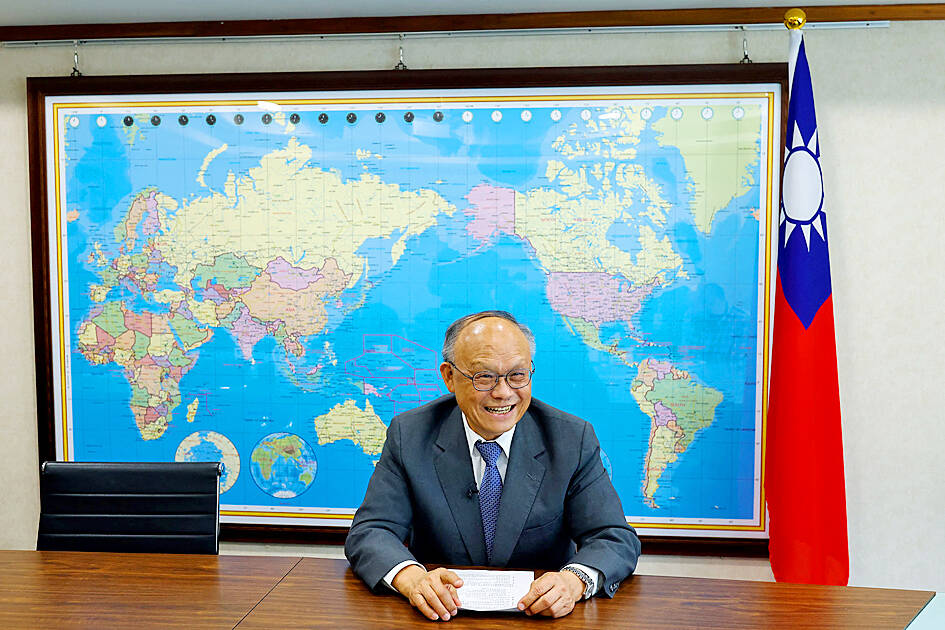Taiwan and the EU should sign a long-stalled investment agreement if Europe wants long-term investment from the nation, Taiwan’s top trade negotiator said yesterday as the bloc courts tech firms such as Taiwan Semiconductor Manufacturing Co (TSMC, 台積電) to build factories there.
Taiwan has repeatedly called for progress on a bilateral investment agreement (BIA) with the EU.
The EU included Taiwan on its list of trade partners for a potential deal in 2015, but it has not held talks with Taipei on the issue since.

Photo: Ann Wang, Reuters
The EU has been courting Taiwan, a major chip producer, as one of the “like-minded” partners it would like to work with under the European Chips Act to encourage more semiconductor production in Europe and lessen dependence on Asia, despite the lack of formal ties with the nation.
Minister Without Portfolio John Deng (鄧振中), Taiwan’s top trade representative, said that Europe was “definitely envious” of TSMC’s US$40 billion investment in Arizona, where it plans to make advanced 3-nanometer chips, because TSMC was bringing a whole supply chain over with it.
“For Europe, this is not the same scale — it’s individual cases, not on the same level as TSMC” in the US, Deng said.
TSMC, the world’s largest contract chipmaker, is in talks over a factory in Germany, which would be its first in Europe, although it would focus on the auto industry and make less-advanced chips.
Taiwan had engaged in lots of dialogue with the EU, but the bloc was resisting establishing a legal framework for investment that would provide “a sense of security” for Taiwanese businesses, Deng said.
“Our argument is that if you want long-term development for the future, a legal framework is very important,” he said. “For example, you want a very large investment for 100 years, 50 years, you don’t want it gone after three years... I think the European Commission needs to be clear on that point.”
Taiwan has also been in talks with Canada for a deal to encourage two-way investment — the Foreign Investment Promotion and Protection Arrangement — and Deng said he expected something to be signed this year.
He said he hoped that Canadian Minister of International Trade, Export Promotion, Small Business and Economic Development Mary Ng (伍鳳儀) might travel to Taiwan to sign it.
“Taiwan is very hospitable,” Deng said. “If she comes, Taiwan will look after her well.”

Taiwan Semiconductor Manufacturing Co (TSMC, 台積電) yesterday said that its investment plan in Arizona is going according to schedule, following a local media report claiming that the company is planning to break ground on its third wafer fab in the US in June. In a statement, TSMC said it does not comment on market speculation, but that its investments in Arizona are proceeding well. TSMC is investing more than US$65 billion in Arizona to build three advanced wafer fabs. The first one has started production using the 4-nanometer (nm) process, while the second one would start mass production using the

A TAIWAN DEAL: TSMC is in early talks to fully operate Intel’s US semiconductor factories in a deal first raised by Trump officials, but Intel’s interest is uncertain Broadcom Inc has had informal talks with its advisers about making a bid for Intel Corp’s chip-design and marketing business, the Wall Street Journal reported, citing people familiar with the matter. Nothing has been submitted to Intel and Broadcom could decide not to pursue a deal, according to the Journal. Bloomberg News earlier reported that Taiwan Semiconductor Manufacturing Co (TSMC, 台積電) is in early talks for a controlling stake in Intel’s factories at the request of officials at US President Donald Trump’s administration, as the president looks to boost US manufacturing and maintain the country’s leadership in critical technologies. Trump officials raised the

‘SILVER LINING’: Although the news caused TSMC to fall on the local market, an analyst said that as tariffs are not set to go into effect until April, there is still time for negotiations US President Donald Trump on Tuesday said that he would likely impose tariffs on semiconductor, automobile and pharmaceutical imports of about 25 percent, with an announcement coming as soon as April 2 in a move that would represent a dramatic widening of the US leader’s trade war. “I probably will tell you that on April 2, but it’ll be in the neighborhood of 25 percent,” Trump told reporters at his Mar-a-Lago club when asked about his plan for auto tariffs. Asked about similar levies on pharmaceutical drugs and semiconductors, the president said that “it’ll be 25 percent and higher, and it’ll

CHIP BOOM: Revenue for the semiconductor industry is set to reach US$1 trillion by 2032, opening up opportunities for the chip pacakging and testing company, it said ASE Technology Holding Co (日月光投控), the world’s largest provider of outsourced semiconductor assembly and test (OSAT) services, yesterday launched a new advanced manufacturing facility in Penang, Malaysia, aiming to meet growing demand for emerging technologies such as generative artificial intelligence (AI) applications. The US$300 million facility is a critical step in expanding ASE’s global footprint, offering an alternative for customers from the US, Europe, Japan, South Korea and China to assemble and test chips outside of Taiwan amid efforts to diversify supply chains. The plant, the company’s fifth in Malaysia, is part of a strategic expansion plan that would more than triple